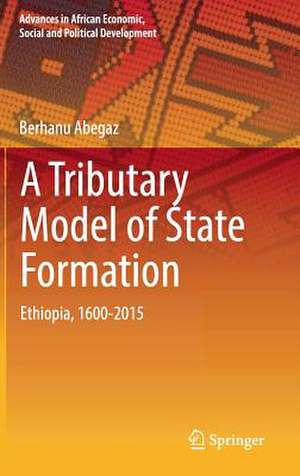A Tributary Model of State Formation: Ethiopia, 1600-2015: Advances in African Economic, Social and Political Development
Autor Berhanu Abegazen Limba Engleză Hardback – 22 iun 2018
This book will be of interest to scholars in economics, political science, political economics, and African Studies.
Berhanu Abegaz is Professor of Economics, College of William & Mary (USA).
| Toate formatele și edițiile | Preț | Express |
|---|---|---|
| Paperback (1) | 580.36 lei 6-8 săpt. | |
| Springer International Publishing – 26 dec 2018 | 580.36 lei 6-8 săpt. | |
| Hardback (1) | 729.23 lei 6-8 săpt. | |
| Springer International Publishing – 22 iun 2018 | 729.23 lei 6-8 săpt. |
Din seria Advances in African Economic, Social and Political Development
- 20%
 Preț: 562.79 lei
Preț: 562.79 lei - 18%
 Preț: 781.45 lei
Preț: 781.45 lei - 15%
 Preț: 648.56 lei
Preț: 648.56 lei - 15%
 Preț: 704.36 lei
Preț: 704.36 lei - 15%
 Preț: 640.71 lei
Preț: 640.71 lei - 15%
 Preț: 645.47 lei
Preț: 645.47 lei - 20%
 Preț: 552.25 lei
Preț: 552.25 lei - 18%
 Preț: 785.24 lei
Preț: 785.24 lei - 24%
 Preț: 694.98 lei
Preț: 694.98 lei - 15%
 Preț: 636.30 lei
Preț: 636.30 lei - 15%
 Preț: 647.08 lei
Preț: 647.08 lei - 18%
 Preț: 891.33 lei
Preț: 891.33 lei - 18%
 Preț: 892.90 lei
Preț: 892.90 lei - 15%
 Preț: 654.43 lei
Preț: 654.43 lei -
 Preț: 391.40 lei
Preț: 391.40 lei - 15%
 Preț: 698.30 lei
Preț: 698.30 lei -
 Preț: 391.61 lei
Preț: 391.61 lei - 15%
 Preț: 642.68 lei
Preț: 642.68 lei - 18%
 Preț: 788.41 lei
Preț: 788.41 lei - 15%
 Preț: 584.43 lei
Preț: 584.43 lei - 15%
 Preț: 644.30 lei
Preț: 644.30 lei - 15%
 Preț: 642.51 lei
Preț: 642.51 lei -
 Preț: 389.88 lei
Preț: 389.88 lei -
 Preț: 432.88 lei
Preț: 432.88 lei - 15%
 Preț: 511.52 lei
Preț: 511.52 lei - 18%
 Preț: 995.83 lei
Preț: 995.83 lei - 18%
 Preț: 953.20 lei
Preț: 953.20 lei -
 Preț: 387.58 lei
Preț: 387.58 lei - 18%
 Preț: 894.34 lei
Preț: 894.34 lei - 15%
 Preț: 644.49 lei
Preț: 644.49 lei -
 Preț: 381.00 lei
Preț: 381.00 lei - 15%
 Preț: 698.62 lei
Preț: 698.62 lei - 15%
 Preț: 639.73 lei
Preț: 639.73 lei - 18%
 Preț: 897.65 lei
Preț: 897.65 lei - 15%
 Preț: 641.85 lei
Preț: 641.85 lei - 15%
 Preț: 639.37 lei
Preț: 639.37 lei -
 Preț: 392.37 lei
Preț: 392.37 lei
Preț: 729.23 lei
Preț vechi: 889.30 lei
-18% Nou
Puncte Express: 1094
Preț estimativ în valută:
139.56€ • 145.16$ • 115.21£
139.56€ • 145.16$ • 115.21£
Carte tipărită la comandă
Livrare economică 15-29 aprilie
Preluare comenzi: 021 569.72.76
Specificații
ISBN-13: 9783319757797
ISBN-10: 3319757792
Pagini: 212
Ilustrații: XXXII, 190 p. 16 illus.
Dimensiuni: 155 x 235 mm
Greutate: 0.49 kg
Ediția:1st ed. 2018
Editura: Springer International Publishing
Colecția Springer
Seria Advances in African Economic, Social and Political Development
Locul publicării:Cham, Switzerland
ISBN-10: 3319757792
Pagini: 212
Ilustrații: XXXII, 190 p. 16 illus.
Dimensiuni: 155 x 235 mm
Greutate: 0.49 kg
Ediția:1st ed. 2018
Editura: Springer International Publishing
Colecția Springer
Seria Advances in African Economic, Social and Political Development
Locul publicării:Cham, Switzerland
Cuprins
Chapter 1: State Formation and Nation Building.- Chapter 2: The Afro-Asiatic Tributary-Civilizational State, 1600-1900.- Chapter 3: The Gondarine Tributary-Military State, 1600-1800.- Chapter 4: The Shewan Fiscal-Territorial State, 1875-1974.- Chapter 5: The Ethiopian Revolutionary State, 1975-2005.- Chapter 6: Reimagining Capable and Inclusionary African States.- Chapter 7: Conclusions.
Notă biografică
Berhanu Abegaz holds a B.A. (Economics) from Princeton University and a Ph.D. (Economics) from the University of Pennsylvania. He is currently Professor and Chair of Economics at William & Mary with teaching and research interests in development economics, institutional economics, and comparative economic systems.
Dr. Abegaz's research interests and publications are wide-ranging and include structural convergence in manufacturing industries, the role of diversified business groups in emerging economies, Party-owned and Military-owned business empires, African industrialization, effectiveness of development assistance, and the history of state formation and agrarian systems in Ethiopia. He has published two books, edited two books, and several refereed journal articles.
Textul de pe ultima copertă
A Tributary Model of State Formation: Ethiopia, 1600-2015 addresses the perplexing question of why a pedigreed Ethiopian state failed to transform itself into a nation-state. Using a comparative-institutionalist framework, this book explores why Ethiopia, an Afroasian civilizational state, has yet to build a modern political order comprising a sturdy state, the rule of law, and accountability to the ruled. The book provides a theoretical framework that contrasts the European and the Afroasian modes of state formation and explores the three major variants of the Ethiopian state since 1600 (Gondar, Shewa, and Revolutionary). It does this by employing the conceptual entry point of tributarism and teases out the implications of this perspective for refashioning the embattled postcolonial African political institutions. The primary contribution of the book is the novel framing of state formation through the lens of a landed Afroasiatic peasantry in giving rise to a fragile statewhose redistributive preoccupation preempted the emergence of a productive economy to serve as a buoyant revenue base. Unlike feudal Europe, the dependence of the Afroasian state on arm’s-length overlordship rather than on tightly-managed landlordship incentivized endemic extractive contests among elites with the capacity for violence for the non-fixed tribute from independent wealth producers. Tributarism, I argue here, stymied the transition from a resilient statehood to a robust nation-statehood that befits an open-order society.
This book will be of interest to scholars in economics, political science, political economics, and African Studies.
Caracteristici
Presents a concise characterization of the Afro-Asiatic model of tributary state formation Focuses on case studies that represent the three variants of the Ethiopian state since the 1600s Offers theoretical implications for modern state-building and nation-building in Africa that go beyond what is typically offered by the neo-patrimonial paradigm
